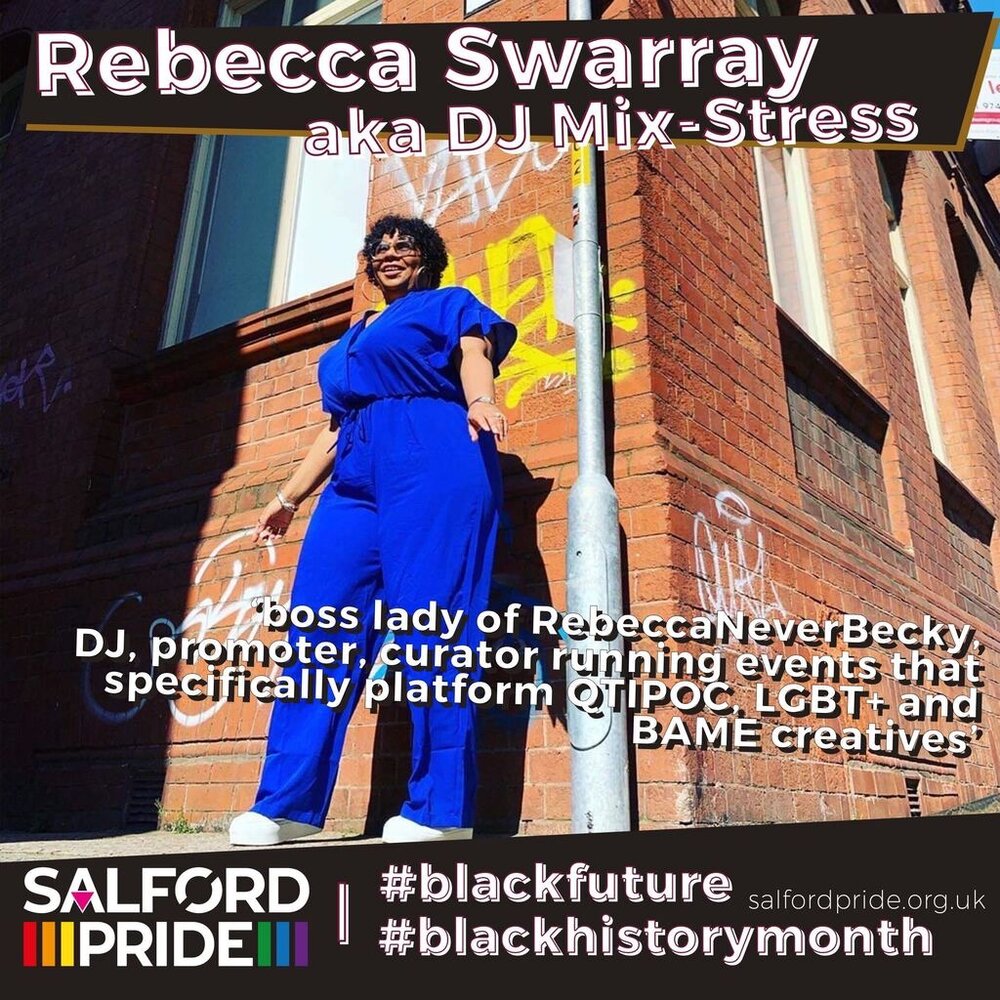
Salford Pride is dedicating the month of October to shining a spotlight on black artists that are members of the LGBT community.
Black History Month traditionally looks back at some of the most influential black people in history, such as Martin Luther King, who dedicated his life trying to make a change for African-Americans.
However, Salford Pride is taking a slightly different approach to Black History Month, focusing more on the present-day and bringing to light a more positive future for the black community.
Alfie Austin is leading the project for Salford Pride and says it’s such an important topic to them.
They said: “There’s obviously been a lot of noise about Black Lives Matter this year which is amazing, so it’s an amazing opportunity for us to keep that going.
“That’s 100% why I wanted to highlight the black future and the positive things going forward because it can move forward and we’re going to make it move forward.”
“What we wanted to do is look at it in a more positive way because there is a lot of negative things within black history month to look back on but we wanted to look forward as well.”
Throughout the month, Salford Pride each week is highlighting a different local black artist and their first spotlight was on Rebecca Swarray.
Salford Pride published an article on their website where Rebecca explains what she does.
Rebecca says: “I am a promoter, DJ and curator organising and running events within the Manchester queer community across the year. Events which specifically platform QTIPOC, LGBT+ and BAME creatives, DJs and performers.”
Introducing our first #BlackFuture Spotlight: Rebecca Swarray/DJ Mix Stress of @RebNeverBecky
Read all about her events, platforming #QTIPOC and how to support the #BAME creatives here: https://t.co/bpCINUHPS7#blackhistorymonth pic.twitter.com/95skLRpPEW
— Salford Pride (@salfordprideuk) October 8, 2020
They have since shined a spotlight on Jamaican born Romario Wanliss who tells stories through spoken words and music to create positivity.
On their website, Salford Pride briefly tells his inspiring story: “Romario creatively known as MrBlackBranson is a Jamaican StoryTeller living in the UK using Life Coaching, Music and SpokenWord to create awareness on Mental Health, Self Care and Positivity.
“Jamaican born and moved to the UK in September of 2008, Romario has been through much adversity including being made homeless twice.
“Today he is on a mission to follow through on his passion for creating stories through visual cinematic pieces to Music & Poetry.”
Our next #BlackFuture Spotlight '@MrBlackBranson – A Jamaican storyteller using spoken word, life coaching & music to create positivity, and we're here for it!
Read what he says on #BlackHistoryMonth and his latest piece ‘I’m Not Proud To Be Trans’ here: https://t.co/2B0kTVW8H1 pic.twitter.com/Q2OCWfuXc9
— Salford Pride (@salfordprideuk) October 16, 2020
The University of Salford is also dedicating the month of October to bring to light. They say: “The stories of our Black and Asian staff and students will be broadcasted across our communication channels to create sustained awareness of their strong, courageous and remarkable contribution to our community.”
The University has a set of online lectures organised for this month on various key topics relating to the inequalities black people face, as well as showcasing the skill and talent of black performance artist Sherrie Hamilton.
Whilst focusing on positive black influences in the community is important to the University of Salford and Salford Pride, Alfie thinks it’s also important to recognise how the black community is still discriminated against in the 21st century.
On the matter, they said: “There are marginalised groups within the LGBT community and black people are in that category of people that experience discrimination within the LGBT community, so it’s about drawing attention to that.”
They continued to say: “I think if you speak to black people about the racism they experience on a daily basis, It’s clear it is still here in the UK.
“I got some information from Stonewall which said that 61% of black people are facing discrimination within their local queer communities which really should be a safe space.
“So it definitely is an issue that is at home and not just America and I think we do need to look at that.”
Another important reason behind this project for Alfie is to support local black artists who as well as facing discrimination, have also suffered due to the impact of COVID-19, which he believes has hit the profession hard.
Alfie said: “The arts as a whole is really suffering and the more marganlised you are, the opportunities get slimmer and slimmer.
“So the fact there is fewer opportunities around [because of COVID-19] and there is this discrimination against black people, in particular, it means their opportunities get smaller and smaller.
“So that’s why I wanted to highlight what they’re doing, how we can support them, and where we can find them because what they’re doing is amazing.”














Recent Comments